How Do I Tell if a Neon Fish Is Pregnant
Your tank is perfect – soft lighting, living plants gently swaying, and a school of glowing neon tetras gliding in unison.
It is peaceful and calming, watching their effortless grace.
On a closer glance, you notice one of your neon tetra seems to have a larger belly than the rest. Could she be pregnant?
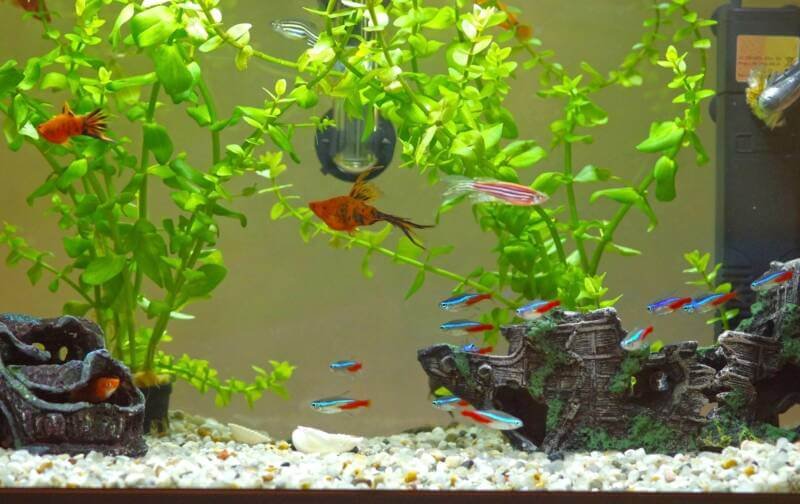
From a biological standpoint, the answer is no. Tetras are an egg-spawning species; however, that swelling in your tetra's belly may indicate the fish is carrying eggs and is ready to spawn.
But how do you know if she is carrying eggs, and what do you do if she is?
Identify Male and Female Fish
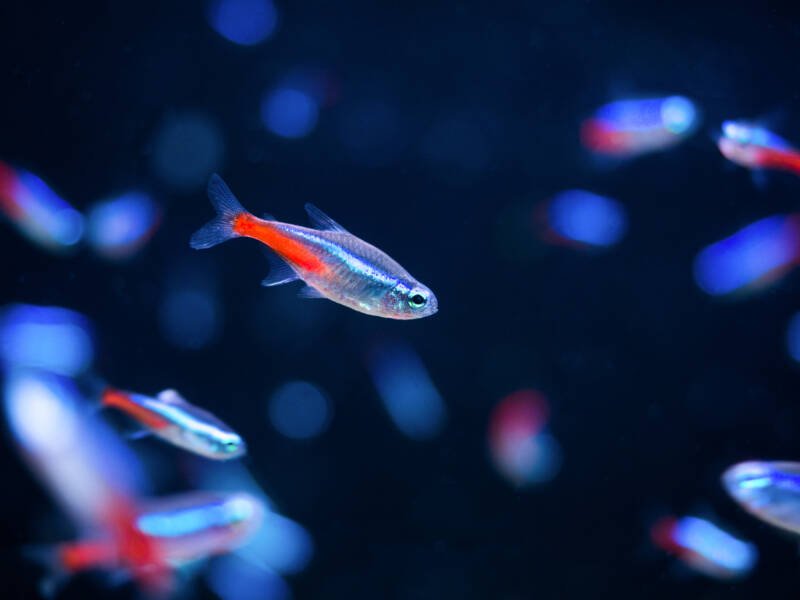
The first step is to figure out which tetras in your tank are male and which are female.
This requires a bit of observation as the two share many characteristics.
Male neon tetra characteristics include:
- Slimmer body shape
- More vivid coloration
- Longer dorsal and anal fins
- Straight neon blue line
Female neon tetra are generally:
- Longer and slightly larger
- More curved body shape
- Less brilliant colors
- Shorter dorsal and anal fins
- Curved neon blue line
Look for Physical Indications
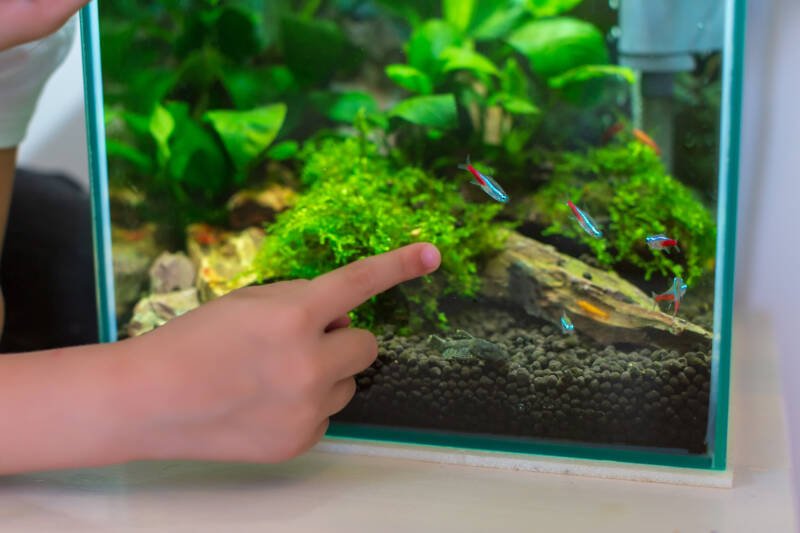
Now that you know which fish are male and which are female compare the body shapes of the females.
If you notice that one female has a larger belly than her tank mates, she may be carrying eggs.
Note Any Courting Behavior
If a pair is ready to breed, another clue may lie in the male tetra's behavior.
Observe if there is any courting behavior by the males in your community tank:
- Unusual swimming patterns: Is your male neon tetra swimming with jumpy movements or in a square pattern? Are they suddenly freezing before resuming swimming? If one of your fish is acting in this manner, courting may be in progress.
- A pair swimming separately from others: If you observe two fish that are always swimming together, you may have a couple that is ready to breed. They often swim a short distance from the rest of the school.
Decide Ahead of Time if You Are Planning on Breeding Your Fish
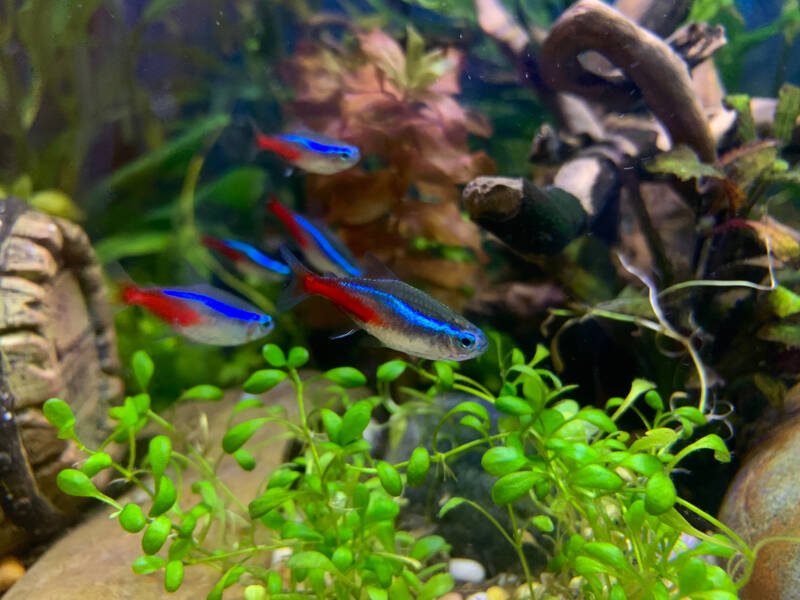
If you do not plan to breed your tetra, no further action is necessary with your egg-bearing female.
If she does spawn in the community tank, the adult fish will likely eat the eggs and any hatching fry.
If you are planning to breed your tetra, it is best to do some research beforehand. A little preparation may better your chances of successfully breeding your tetras.
Prepare a Separate Breeding Tank
You will need a separate breeding tank to promote a successful spawning.
- A smaller, 5 to 10-gallon tank will do.
- Include a dark, sandy bottom, live plants, and moss.
- A spawning mop is useful as a location for the female to deposit eggs.
- Ensure you can control the amount of light the tank receives, as the eggs and fry are light-sensitive.
Keep the water temperature between 70 – 81°F (21-27°C) (recommendations vary by a degree or two, but generally fall in this range).
A temperature around 78 degrees should promote spawning.
Use water that is soft, conditioned, and filtered. Water should be slightly acidic, with no ammonia, nitrite, or nitrate contamination.
Keep the pH level between 6.0 and 7.0. Drastic changes in water chemistry can be fatal for neon tetras, their eggs, and fry.
Ensure Your Fish Have Quality Food
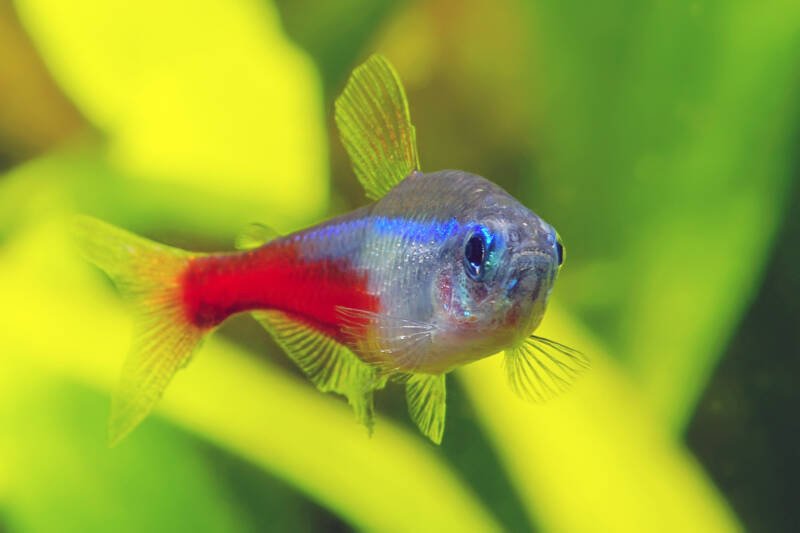
Feeding your fish high-quality food is always important, but even more so if you plan to breed them.
Include live or high-protein foods, such as bloodworms, brine shrimp, and Daphnia.
These foods provide a well-rounded diet, including the necessary vitamins and minerals that can increase the overall health of your tank.
Check for Eggs
Tetra eggs are difficult to see. They are very small, round, and clear white or yellow.
You can find them stuck to the moss or plant leaves and occasionally on the sandy floor.
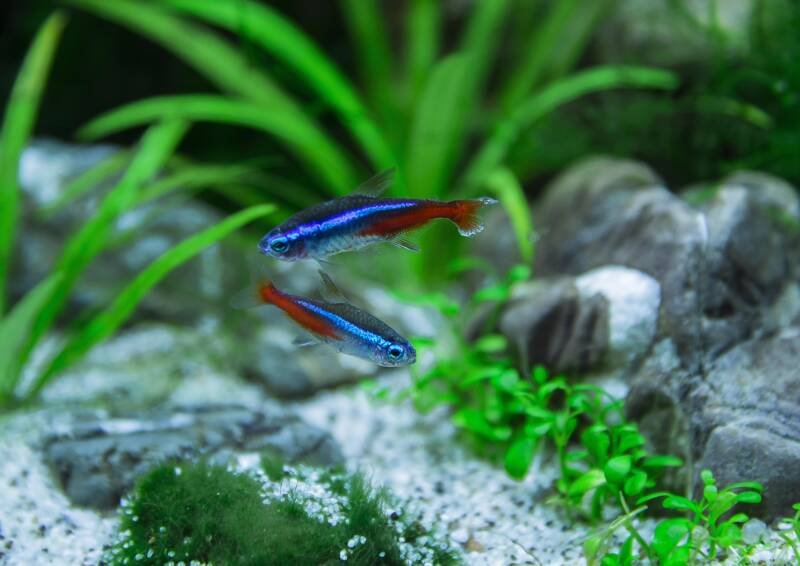
A single female tetra can lay anywhere from 60 to 130 eggs, which take approximately 24 hours to hatch.
Once the eggs are laid and fertilized, return the adults to their regular tank as they will tend to eat the eggs or the fry once they hatch.
Free swimming fry look like tiny little shards of glass drifting in the tank.
Plan for Enough Tank Space
Ensure you have adequate space to raise the babies to adulthood.
A 10-gallon tank is suitable for raising a large number of newly-hatched fry, but they will eventually require more room.
About 20 to 30 fry can be successfully raised to adulthood in a 10-gallon tank.
Once they reach maturity, you can move the young fish into the community tank or give them away.
Feed Your Fry
After the eggs hatch, wait five days, then add a small amount of food to the water.
Use small-sized food sources, such as green water or vinegar eels. The fry can more easily ingest the small particles.
You can purchase commercial fry foods, but live food may promote better feeding.
Save larger food sources, such as micro worms or brine shrimp, until the fry are about two to three weeks old.
Then, give a few small feedings every day to promote the fast growth of your fry.
Change the Water
Do not change the water in the spawning tank during the first week.
After that, change a small amount (approximately 10 to 15 percent).
Once the fry are two to three weeks old, change 30 percent of the water daily.
Control the Lighting
Keep the light off for the first 48 hours to allow the eggs to hatch and the larvae to develop into free-swimming fry. After that, keep the light low.
Closing Thoughts
So, is your neon tetra pregnant? No. But is she ready to spawn? Perhaps.
Do your research and prepare your tanks. Follow the advice of successful breeders.
In addition to the joy of witnessing nature at work, you will have plenty of beautiful new neon tetras gliding around your tank.
Have you successfully bred your neon tetras? Share your experiences and tips below.
How Do I Tell if a Neon Fish Is Pregnant
Source: https://fishtankadvisor.com/pregnant-neon-tetra/
0 Response to "How Do I Tell if a Neon Fish Is Pregnant"
Post a Comment